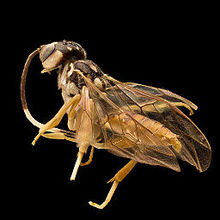Trigonalidae is a family of parasitic wasps in the suborder Apocrita. They are the only living members of the superfamily Trigonaloidea. Trigonalidae are divided into 2 subfamilies; Orthogonalinae and Trigonalinae. These wasps are extremely rare, but surprisingly diverse, with over 90 species in 16 genera, and are known from all parts of the world.[2][3] It is possibly the sister group to all Aculeata.
| Trigonalidae Temporal range:
| |
|---|---|

| |
| Orthogonalys pulchella | |
| Scientific classification | |
| Domain: | Eukaryota |
| Kingdom: | Animalia |
| Phylum: | Arthropoda |
| Class: | Insecta |
| Order: | Hymenoptera |
| Superfamily: | Trigonaloidea |
| Family: | Trigonalidae Cresson, 1887[1] |
| Genera | |
|
See text
| |
| Synonyms | |
|
Trigonalyidae Krieger, 1894 | |
Ecology
editWhat little is known about the biology of these insects indicates a remarkably improbable life history: in nearly all known species, females lay thousands of minute eggs, "clamping" them to the edges of, or injecting them inside leaves. The egg must then be consumed by a caterpillar. Once inside the caterpillar, the trigonalid egg either hatches and attacks any other parasitoid larvae (including its siblings) in the caterpillar, or it waits until the caterpillar is killed and fed to a vespid larva, which it then attacks. If the caterpillar is neither attacked by another parasitoid nor fed to a vespid, the trigonalid larva fails to develop. Therefore, they are parasitoids or hyperparasitoids, but in a manner virtually unique among the insects, in that the eggs must be swallowed by a host, and even more unusual in that there may be an intermediate host. A few species are known exceptions, which directly parasitise sawflies.[4]
Nomenclature
editThe name of this family has also been spelled "Trigonaloidae" and "Trigonalyidae". These are unjustified emendations of the name and incorrect under Article 29.5 of the ICZN.[5][6][note 1] Despite this, some authors have continued to use the latter, "Trigonalyidae" spelling.[7][8]
Taxonomy
editThe fossil record of the family is poor, and there are no confirmed members of the family prior to the Cenozoic, with the oldest being from the Ypresian Eocene Okanagan Highlands in western North America.[9] A possible specimen is known from the mid-Cretaceous Burmese amber of Myanmar, but this differs substantially from modern members of the family, and may belong to the stem-group.[10] Suggested relatives of Trigonalidae within Trigonaloidea include the extinct family Maimetshidae, known from the Cretaceous period.[11]
Genera
editReferences
edit- ^ Synopsis of the families and genera of the Hymenoptera of America, north of Mexico, together with a catalogue of the described species, and bibliography. ET Cresson, Transactions of the American Entomological Society …, 1887
- ^ Trigonalidae Website
- ^ Carmean, David; Kimsey, Lynn (1998-01-01). "Phylogenetic revision of the parasitoid wasp family Trigonalidae (Hymenoptera)". Systematic Entomology. 23 (1): 35–76. Bibcode:1998SysEn..23...35C. doi:10.1046/j.1365-3113.1998.00042.x. ISSN 1365-3113. S2CID 84982520.
- ^ A., Triplehorn, Charles (2005). Borror and DeLong's introduction to the study of insects. Johnson, Norman F., Borror, Donald J. (Donald Joyce), 1907-1988. (7th ed.). Belmont, CA: Thompson Brooks/Cole. ISBN 9780030968358. OCLC 55793895.
{{cite book}}: CS1 maint: multiple names: authors list (link) - ^ Engel, M.S.; Arkady, L.S. (2020-01-31). "On the spelling of family-group names based on the genus Trigonalys Westwood (Hymenoptera: Trigonalidae versus Trigonalyidae)". Entomologist's Monthly Magazine. 156 (1): 58–60. doi:10.31184/M00138908.1561.3989. ISSN 0013-8908. S2CID 213942121.
- ^ Aguiar, Alexandre P.; Deans, Andrew R.; Engel, Michael S.; Forshage, Mattias; Huber, John T.; et al. (30 August 2013). "Order Hymenoptera. In: Zhang, Z.-Q. (Ed.) Animal Biodiversity: An Outline of Higher-level Classification and Survey of Taxonomic Richness (Addenda 2013)". Zootaxa. 3703 (1): 51. doi:10.11646/zootaxa.3703.1.12. PMID 26146682.
- ^ Chen, Hua-Yan; Hong, Chun-Dan; van Achterberg, Cornelis; Pang, Hong (12 March 2020). "New species and new records of Trigonalyidae (Hymenoptera) from Tibet, China". ZooKeys (918): 83–84. Bibcode:2020ZooK..918...83C. doi:10.3897/zookeys.918.49729. PMC 7082393. PMID 32210666.
- ^ Zhang, Bing-Lan; Yan, Cheng-Jin; van Achterberg, Cornelis; Peng, Yan-Qiong; Chen, Hua-Yan (29 April 2022). "Integrated taxonomy unveils new species of Trigonalyidae (Insecta, Hymenoptera) from Yunnan, China" (PDF). Journal of Hymenoptera Research. 90: 101–128. doi:10.3897/jhr.90.80150. Retrieved 11 February 2023.
- ^ Archibald, S. B.; Rasnitsyn, A. P.; Brothers, D. J.; Mathewes, R. W. (2018). "Modernisation of the Hymenoptera: ants, bees, wasps, and sawflies of the early Eocene Okanagan Highlands of western North America". The Canadian Entomologist. 150 (2): 205–257. doi:10.4039/tce.2017.59. ISSN 0008-347X. S2CID 90017208.
- ^ Zhang, Qi; Rasnitsyn, Alexandr P.; Wang, Bo; Zhang, Haichun (2018-12-01). "Hymenoptera (wasps, bees and ants) in mid-Cretaceous Burmese amber: A review of the fauna". Proceedings of the Geologists' Association. 129 (6): 736–747. Bibcode:2018PrGA..129..736Z. doi:10.1016/j.pgeola.2018.06.004. ISSN 0016-7878. S2CID 134358795.
- ^ "Trigonaloidea". Encyclopedia of Life. Retrieved 17 June 2021.
Notes
edit- ^ ICZN Code 29.5. Maintenance of current spellings. If a spelling of a family-group name was not formed in accordance with Article 29.3 but is in prevailing usage, that spelling is to be maintained, whether or not it is the original spelling and whether or not its derivation from the name of the type genus is in accordance with the grammatical procedures in Articles 29.3.1 and 29.3.2.